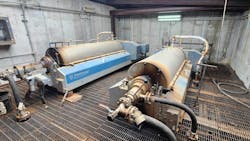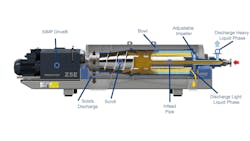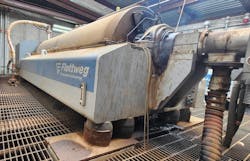Case study: Low maintenance centrifuges help clean oil producer boost productivity
In an industry where there is no room for error, Integrated Water Management needed a solution to produce the cleanest water and oil possible from produced brine water and oily wastes. After trying many technologies — including high-maintenance belt presses, chamber filter presses and screw presses — the environmental solutions company invested in low-maintenance, easy-to-operate, high-performing centrifuge Tricanters that have served them since 2011.
“We started out looking for a solution to clean oil,” said IWM CEO Nate Robinson. “We tried belt presses and other technologies that required much more maintenance, including shutdowns for cleaning. Every time we shut it down and then opened up the equipment, it released harmful vapors, which was dangerous. It just wasn’t a good fit. We looked at many options and began experimenting with centrifuges. We purchased a Flottweg machine, and our business began to boom.”
The Flottweg Tricanter offered IWM a viable solution.
“The centrifuge technology is a closed system with controllable venting arrangements,” Robinson said. “All we had to do was start it up and let it go. It will pretty much create anything that we need. With the monitoring technology, we could see what was going on at any time. We would just set it and run it. Once it reached our standards, we just kept that setting and didn’t have to think about it again.”
Producing clean oil from oily wastes
IWM serves the energy production industry with containment and environmental mitigation services. Robinson said that IWM’s product liability is the heart of its business. The state-of-the-art, 90-acre facility is located seven miles north of Duchesne, Utah, and manages all the challenges that come with processing non-conventional waste treatment and other services for the oil and energy industry.
When oilfield production water and other production fluids arrive at the IWM facility, it begins a unique and proprietary journey through the plant. Using a complex series of tanks and processes, the water is cleaned of nearly 100% of hydrocarbons. The water then makes its way to evaporation ponds and eventually to a disposal well, which the company claims is the cleanest in the industry — making it ideal for customers’ liability concerns, good for the industry and good for the environment. IWM’s treatment and disposal services help to ensure minimal impact on the surrounding environment, which translates to maximum compliance with applicable regulations and minimal liability to producers.
“We bring in wastewater, and the first step is to separate the solids from the water,” Robinson said. “The solids go into a tank where it is processed and dried. Once dried, we pull off the remaining water and separate it from the oil. Then the clean oil is sent to the refineries.”
The Duchesne facility produces an average of six barrels of clean oil per minute and distributes it nationwide.
How the centrifuge technology works
In 2011, IWM installed a Flottweg Tricanter that operated with no issues. In 2014, two additional Z4E Tricanters were added to expand production. However, due to exponential growth, the company upgraded to the Z5E and Z6E versions in 2019.
When solid/liquid mixtures with a high portion of solids need to be separated, decanter centrifuges are a viable solution. In contrast to chamber filter presses, these solid shell scroll centrifuges or decanters operate continuously. High centrifugal forces separate the finely distributed solid particles from the suspension.
The modular design makes them useful in a wide variety of industries throughout the world. The centrifuges are adapted optimally to the specific application. Applications range from sludge dewatering to classification or wet classification to the sorting of solids.
To obtain optimum results, solid bowl decanter centrifuges must be custom designed to suit specific separation processes.
Decanter centrifuges separate fine solids from a suspension and optimally clarify the separated liquid. The adjustable impeller makes it possible to adjust the residence time of the mixture in the decanter bowl during operation. If the conditions at the inlet change, the separation result and solids content in the discharge always remain constant. Traditional machines have static wear plates, which means that the entire machine must be disassembled and reassembled to accommodate a change in inlet mixtures. These are costly downtimes that are skipped by the turn of a leveler.
Another Flottweg feature is the Simp Drive. This drive system regulates the differential speed of the screw conveyor (scroll) according to the load. If the differential speed is too low, there is a risk of blockage. With the correct setting, the system protects against overload and blockage. The drive makes constant adjustments to ensure the machine operates at optimal levels.
If the centrifuge needs be sealed against the atmosphere, Flottweg offers various sealing systems, including atmospheric centrifuges and vapor-purged/inert centrifuges. These systems eliminate oxygen from the equation which reduce hazardous materials risk.
Various monitoring systems control vibration and speed. All are integrated into a Flottweg provided control system which allows constant monitoring and plenty of alerts to prevent issues before they become serious.
All of the following features help keep operational costs down and most importantly provide peace of mind:
- Custom-made decanter centrifuge solutions for the individual processes helps to achieve optimum separation results.
- Mechanical separation of liquids and solids with decanter centrifuges requires high forces. Abrasive materials or media with corrosive properties cause wear, abrasion and erosion. For all decanter components in contact with the product, it is recommended to use high-quality corrosion- and acid-resistant stainless steels.
- Decanter centrifuges can be equipped with different lubrication systems. All lubrication systems allow the rotor bearings to be re-lubricated during operation.
- The elimination of consumables (such as filter cloths and filter aids) additionally reduces maintenance and operating costs of decanter centrifuges.
- Modern automation options reduce the effort needed to operate the system to a minimum. This means that these decanter centrifuges can be easily integrated into clean-in-place (CIP) systems.
- With vibration monitoring, vibration is detected by a sensor. If the maximum permissible value is reached, an alarm is triggered, and the centrifuge is switched off. The speed monitoring measures the differential bowl and scroll speed with two inductive proximity switches and displays them digitally.
- By monitoring maximum and minimum values, critical operating states are prevented, and relevant safety standards are met. The temperature monitoring of the bearings with resistance thermometers makes remote monitoring possible. The drive motor switches off at a pre-selected temperature limit depending on the application. In this way, bearing damage can be prevented.
IWM results
Since installing the centrifuges, IWM has experienced growth and high-quality production.
“Using these centrifuges has changed our facility for the better,” Robinson said. “We have been able to increase production while handling and controlling the quality of production better. The upgraded machines were brought on by growth of the company, not bad performance by the machines.”
Robinson emphasized that the steady flow throughput, durability, and low cost to operate has made IWM’s production “10 times better.”
“We have had no problems since installation, and Flottweg’s service has been amazing,” Robinson said. “We’ve had technicians come in and grease bearings, change some of the wear parts, and other minor maintenance. We are on a preventive maintenance schedule with Flottweg. This equipment and Flottweg’s service is second to none. When your company grows with this kind of speed, you need equipment that can keep up. That’s what we get from using these decanters.”
Terry Ostrom is the mining and minerals industry manager at Flottweg Separation Technology, Inc. He has a broad background in processing equipment including pumps, reagent systems and centrifuges. This along with his mining process engineering experience makes him well suited to support this industry.





